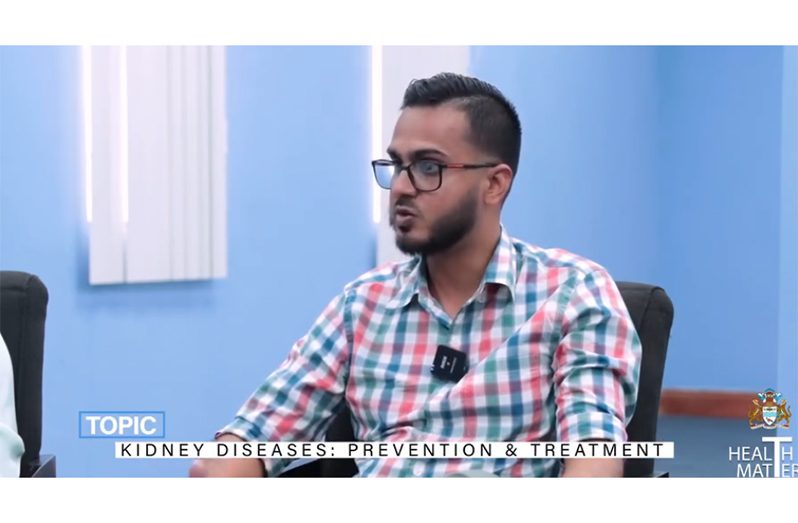By Feona Morrison
IN the continuous fight against chronic kidney disease (CKD), specialists are using education as a potent tool more and more. Proactive steps to combat this crippling ailment are more important than ever, as CKD affects millions of people globally, and is becoming more common.
The Ministry of Health is stressing that healthcare education is more crucial than ever as the world gets ready for World Kidney Day, which is celebrated every year on the second Thursday in March.
According to nephrologist at the Georgetown Public Hospital Corporation (GPHC), Dr. Baldeo Singh, CKD, characterised by the gradual loss of kidney function over time, poses significant health risks if left unchecked. However, with the right knowledge and awareness, he said individuals can take steps to prevent, detect, and manage the disease effectively.
During a recent episode of the ministry’s “Health Matters” show, he made this assertion.
According to him, the main functions of the two kidneys that most individuals have are to filter blood, remove waste from the body, and maintain the proper balance of bodily fluids.
However, these functions become irregular with kidney failure, Dr. Singh stressed.
“When you have kidney failure, those functions become abnormal. So, what really happens… you’re unable to get rid of your waste products, and it makes you sick. You’re unable to get rid of the excess fluids, and you start to notice swelling…”
UNNOTICEABLE SYSMTOMS
He went on to explain that symptoms of kidney failure may not be noticeable until the condition is advanced.
Dr. Singh said: “The funny thing about kidney disease is that there are five stages: Stage one, stage two, stage three [go] unnoticeable, meaning that the patient might not even know they have kidney disease, and that they are already at stage three.
So, it is important to have follow-ups, especially given that the most common risk factor for kidney disease is diabetes, and diabetes is the leading cause of chronic kidney disease in the world as well as hypertension.”
He said there are two types of kidney diseases: Acute kidney injury and chronic.
The physician clarified that certain drugs, such as those older people take for joint pains, can harm the kidneys.
He added that renal failure can strike at any time in life, and that there are several factors, including genetics, that might damage the kidneys and eventually lead to kidney failure.

“Then, there is herbal treatment that patients take that can lead to kidney failure… Even snake bites can lead to kidney failure. I’ve had a few patients that have had kidney failure from snake bites, from malaria, from dengue,” Dr. Singh noted.
The nephrologist said that although there is no cure for chronic kidney disease, it can be slowed down before it reaches the end.
“When I say the end, it’s either you need dialysis or transplant when the kidney fails,” he explained.
According to Dr. Singh, people’s glomerular filtration rate (GFR) starts to decrease between the ages of 50 and 55. Your kidneys’ ability to filter blood is gauged by your GFR.
Kidney disease can therefore result from this, in addition to any underlying illnesses, he noted.
Furthermore, because kidney and eye disorders are related, Dr. Singh stated that having kidney disease increases your risk of developing eye diseases.
He emphasised that heart disease is the primary cause of death for people with kidney disease, and that kidney illness significantly raises the risk of heart disease and vice versa.
TAKE CONTROL
For her part, Dr. Nandishaw Ramsingh, government’s Technical Officer for Diabetes and Kidney Care, urged persons to take control of their health.
“You feel ill or you don’t feel ill, still go to a health centre that is nearby to you.
When we talk about screening, especially in kidney disease, a simple blood test and urine test is all it takes, especially if you’re diabetic or hypertensive. Do your regular check-ups; advocate for yourself to your doctors…You would like to get your test done; every six months it is recommended, but ensure that you have this simple blood test that looks at your kidney function.”
She said the health ministry has launched programmes to ensure that individuals with kidney disease have enhanced access to essential medical services, including screening, diagnosis, treatment, and support.
Furthermore, according to Dr. Ramsingh, the importance of family support cannot be stressed on enough, because families are essential in providing emotional, practical, and sometimes even medical assistance to their loved ones who are navigating through kidney disease.
In 2022, the government launched an initiative geared at providing financial support to persons suffering from kidney failure, and require dialysis, a much-needed treatment for the management of their condition.
Persons who are affected by kidney failure and have end-stage kidney disease receive an annual subsidy of $600,000. Then, in January, doctors at the Guyana Public Hospital Corporation (GPHC) made history by performing the first laparoscopic donor nephrectomy in Guyana.
The operation was performed on a woman who donated her kidney to a 17-year-old male relative. The youngster has been battling chronic kidney failure.




.jpg)









